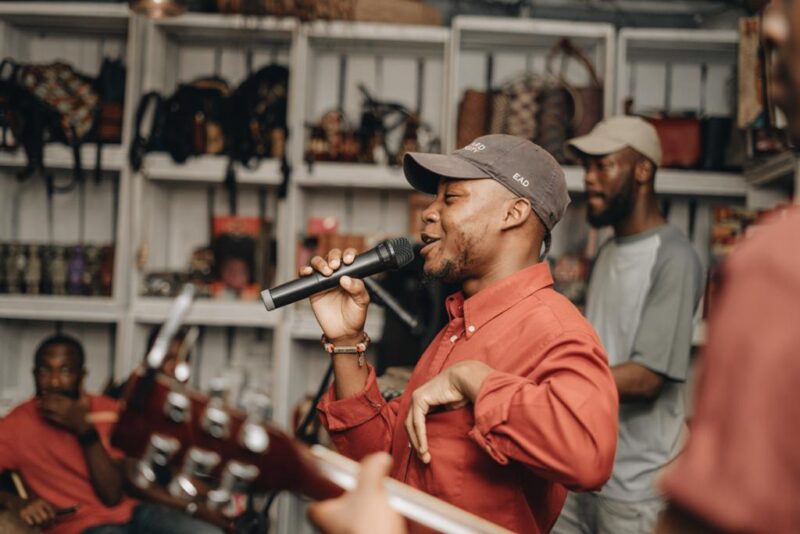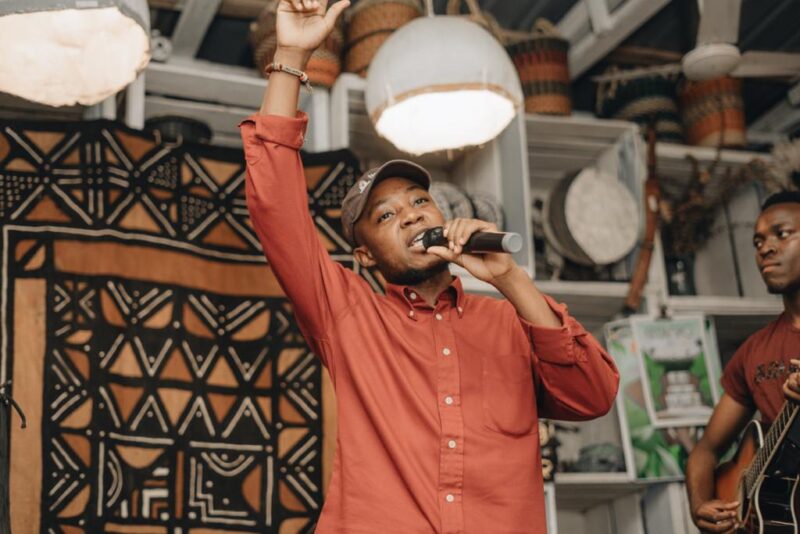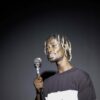Meet Koo Kumi, the spoken word artist redefining the art of storytelling through his poetry.
Throughout history, Griots have maintained a level of importance within society. Challenged to preserve the stories, folk tales, narratives, and oral traditions of our people, griots identify issues and inform the masses about social problems through creativity. Griots are classified as a class of travelling poets, musicians, and storytellers who maintain the tradition of oral history within our culture. In this interview, we get to know a Modern-Day Griot.
Dedicated to conserving the traditions of his people and culture, Koo Kumi is a creative who identifies himself as a multi-disciplined artist with a background in visual arts and performance art. Known for his dynamic spoken word pieces and poignant delivery, Koo Kumi is redefining the art of storytelling through his poetry. A leader and founder of Trotro Vibes, a literacy art movement that uses public transport as a stage to perform, Koo Kumi is committed to changing how the world consumes spoken word. With a plethora of accolades under his belt, this spoken word artist has managed to create a distinctive blend of music where he integrates his poetry with elements of Hip Hop, drill, reggae, highlife, and Traditional Palm wine music.
We linked up with Koo Kumi to explore his art, personal story, inspirations, influences, and projects.

Tell us a bit about yourself? Who is Koo Kumi?
My real name is William Du Bois Kumi Yaw Sakyi, I live on art thus performing and visual art. I’ve been actively doing spoken word since 2012 and I currently reside in my hometown, Mampong Akuapem. I hope I live to see everything I’ve imagined come to pass.
If you had to describe your sound to someone who hasn’t heard your work before, what would you describe it as?
I’ve been told several times that my poems are different. Recently, I figured out why they’ve been saying that. I have a different delivery style which varies depending on the piece I am working on and it is a fusion of different genres of music. I experiment a lot with my sounds, so it’s easier for me to tell someone who hasn’t heard me before about a unique experimental sound, alternative, and thought-provoking.
What genre would you classify your music under?
If any of my poems ever gets classified under music, it’s going to be different to confine. I have experimented with Hip Hop, Traditional Palm wine music, classical, reggae, and Highlife. Recently I experimented with the drill sub-genre with poetry. Maybe one day I will decide to settle on one but for now, I am enjoying the idea of fusing genres.

What inspired you to begin to create?
In Ghana and some other parts of the world, people have a perception of spoken word artists and how they deliver their poems. The inspiration became clearer when I started Trotro Vibes and did a lot of live performances. I was interested in getting people interested in poetry and one thing I loved about the whole live sessions was how we blended music with poetry so I decided to take it to the studio. Also, there are some types of music I enjoy, I try to create that with my productions so I could also give someone something different to listen to.
What themes do you explore within your works and album?
My previous EPs had more than two themes. I’ve touched on Politics, Religion, love, pain associated with death, death, and mental health.
This time, I added Sexual violence, victim-blaming, Ageism, and the role of an artist. Each poem is inspired by a story, sometimes personal sometimes not personal so it makes the delivery and production very vulnerable.
Name some of your musical influences? How have they shaped your sound?
I love Ko-Jo Cue, Wanlov The Kubolor, Mensah, Agya Koo Nimo, Okyeame Kwame. I get inspired by what they talk about and how they deliver their stories. I also enjoy the works of Wretch 32. Before I heard Kojey Radical, a friend told me I remind him of Kojey, so I gave his sound a try and I was hooked. I would add Tobe and the Originals as part of my influences because since 2017 after hearing them, I’ve enjoyed the path of experimentation more.
What are some gems you have learned in your musical journey that you would like to share?
My new album is a very musical one even though I’ve enjoyed the privileges of a poet or spoken word artist. I learned so many things during the production of this album. One thing I would love to share is “do not limit yourself to what you know only” be accommodating of other people’s suggestions and be willing to make changes. For the first time in my life, I was able to sing something I wrote in front of people all because I opened up and got help.
What current projects do you have out, and where can we find them?
I dropped a single from The Griot titled Ankonam on all music platforms but before that I two EPs out and a number of single releases too. I have Woke On The Mountain which came with six poems and a skit, I have An Ode To A New Moon which also consist of 3 poems.
What was the inspiration behind the album “The Griot”?
The inspiration was to tell stories with no filters. It was to present the truest forms of stories which are normally told but with a lot of additions and subtractions. For the sound or music bit of it, it was an experiment, an avenue for me to see how elastic poetry can be so current trends such as drill was featured on this album to draw in all the drill fans who are not fans of poetry. In all, my experiences with people played a major part in this.
What artists and producers were featured on this album?
The interesting thing about The Griot when it comes to production is that all the producers are from the Akuapem ridge, and all poems were recorded in Inner Groove Studios also in Aburi Akuapem. I worked with Seanday, Nsenkuman, A Million Drumx, Bills and Chief Abiola as engineers, producers and song arrangers. I was honoured to have Ko-Jo Cue, Nene Narh, and Hillary on pieces in the project. There are some additional voices from some cool Ghanaian voices such as Nikki Samonas and Wanlov The Kubolor.
What do you want listeners to take away from your “The Griot”?
I want them to take away the energy from this album and turn it into something positive for themselves and the generations to come. There’s anger, pain and reflections all bundled up in this and I would love to see or hear people living it out.
What is your favourite track on your upcoming album release?
Wow! My works are like my children and I love all of my children but on this project, I would suggest you pay attention to all the tracks especially Accra, Man of the House, and Same Old Song.
What is Next for Koo Kumi?
I am still going to experiment more, do more and try my best to stay active. It’s not easy being an artist especially in Ghana so who knows I might wake up one day and decide to take a long sabbatical from this life but for now, art is all I have and that’s all I will be doing.
On November 28, 2020, Koo Kumi released a new album entitled The Griot. The album consists of 10 poems. These 10 poems and skits tackle politics, urbanization and movement, culture, age of youth, and gender-related subjects such as sexual violence and victim-blaming (sexual abuse). The Griot seeks to present stories in its truest forms to start conversations about the above topics. All the poems were produced and engineered by various talented young people all from the Akuapem Ridge in Inner Groove Studios located at Aburi Akuapem.
Stream “The Griot” by Koo Kumi via Apple Music or any streaming platform.

